Should assisted dying be legalized in the UK?
VerifiedAdded on 2023/06/13
|10
|2968
|460
AI Summary
This essay discusses the pros and cons of legalizing assisted dying in the UK. It covers the legal aspects, ethical considerations, and public opinion on the matter. The thesis statement argues for the legalization of assisted dying in the UK. The essay provides examples of cases where terminally ill patients were denied the right to end their lives with dignity. It also discusses the economic and humanitarian aspects of assisted dying. The essay concludes that there is an urgent need to legalize assisted dying in the UK, but it should be done based on carefully planned regulatory criteria.
Contribute Materials
Your contribution can guide someone’s learning journey. Share your
documents today.
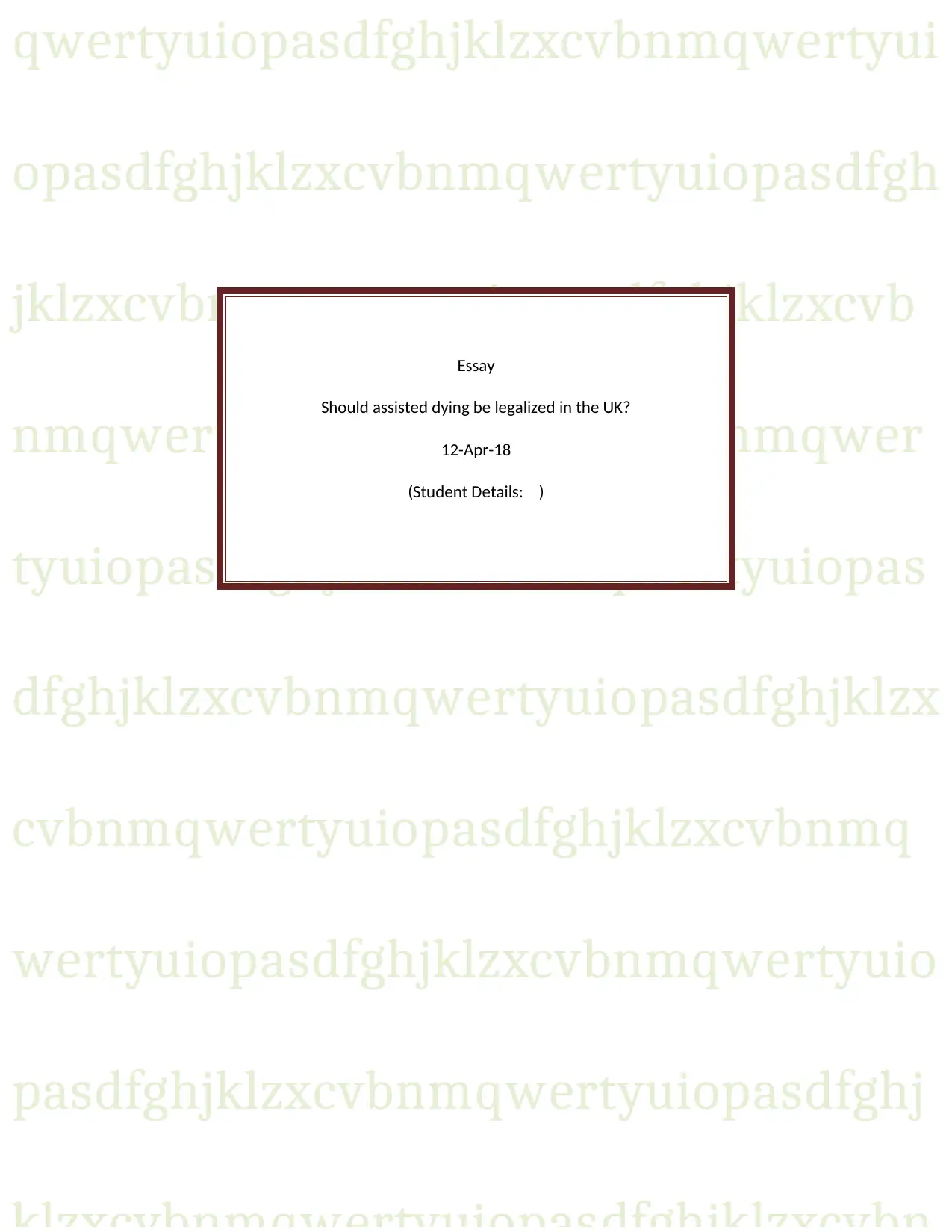
qwertyuiopasdfghjklzxcvbnmqwertyui
opasdfghjklzxcvbnmqwertyuiopasdfgh
jklzxcvbnmqwertyuiopasdfghjklzxcvb
nmqwertyuiopasdfghjklzxcvbnmqwer
tyuiopasdfghjklzxcvbnmqwertyuiopas
dfghjklzxcvbnmqwertyuiopasdfghjklzx
cvbnmqwertyuiopasdfghjklzxcvbnmq
wertyuiopasdfghjklzxcvbnmqwertyuio
pasdfghjklzxcvbnmqwertyuiopasdfghj
Essay
Should assisted dying be legalized in the UK?
12-Apr-18
(Student Details: )
opasdfghjklzxcvbnmqwertyuiopasdfgh
jklzxcvbnmqwertyuiopasdfghjklzxcvb
nmqwertyuiopasdfghjklzxcvbnmqwer
tyuiopasdfghjklzxcvbnmqwertyuiopas
dfghjklzxcvbnmqwertyuiopasdfghjklzx
cvbnmqwertyuiopasdfghjklzxcvbnmq
wertyuiopasdfghjklzxcvbnmqwertyuio
pasdfghjklzxcvbnmqwertyuiopasdfghj
Essay
Should assisted dying be legalized in the UK?
12-Apr-18
(Student Details: )
Secure Best Marks with AI Grader
Need help grading? Try our AI Grader for instant feedback on your assignments.
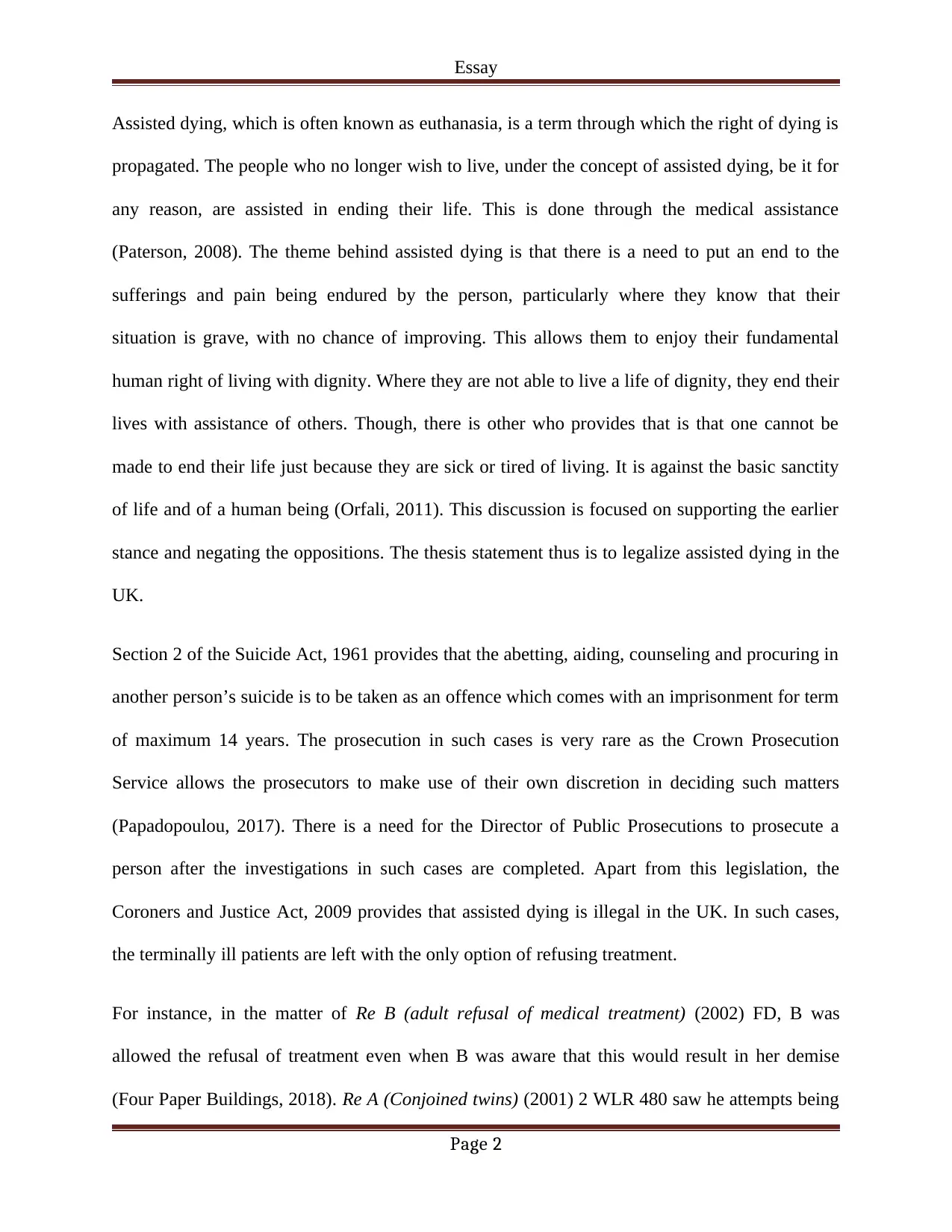
Essay
Assisted dying, which is often known as euthanasia, is a term through which the right of dying is
propagated. The people who no longer wish to live, under the concept of assisted dying, be it for
any reason, are assisted in ending their life. This is done through the medical assistance
(Paterson, 2008). The theme behind assisted dying is that there is a need to put an end to the
sufferings and pain being endured by the person, particularly where they know that their
situation is grave, with no chance of improving. This allows them to enjoy their fundamental
human right of living with dignity. Where they are not able to live a life of dignity, they end their
lives with assistance of others. Though, there is other who provides that is that one cannot be
made to end their life just because they are sick or tired of living. It is against the basic sanctity
of life and of a human being (Orfali, 2011). This discussion is focused on supporting the earlier
stance and negating the oppositions. The thesis statement thus is to legalize assisted dying in the
UK.
Section 2 of the Suicide Act, 1961 provides that the abetting, aiding, counseling and procuring in
another person’s suicide is to be taken as an offence which comes with an imprisonment for term
of maximum 14 years. The prosecution in such cases is very rare as the Crown Prosecution
Service allows the prosecutors to make use of their own discretion in deciding such matters
(Papadopoulou, 2017). There is a need for the Director of Public Prosecutions to prosecute a
person after the investigations in such cases are completed. Apart from this legislation, the
Coroners and Justice Act, 2009 provides that assisted dying is illegal in the UK. In such cases,
the terminally ill patients are left with the only option of refusing treatment.
For instance, in the matter of Re B (adult refusal of medical treatment) (2002) FD, B was
allowed the refusal of treatment even when B was aware that this would result in her demise
(Four Paper Buildings, 2018). Re A (Conjoined twins) (2001) 2 WLR 480 saw he attempts being
Page 2
Assisted dying, which is often known as euthanasia, is a term through which the right of dying is
propagated. The people who no longer wish to live, under the concept of assisted dying, be it for
any reason, are assisted in ending their life. This is done through the medical assistance
(Paterson, 2008). The theme behind assisted dying is that there is a need to put an end to the
sufferings and pain being endured by the person, particularly where they know that their
situation is grave, with no chance of improving. This allows them to enjoy their fundamental
human right of living with dignity. Where they are not able to live a life of dignity, they end their
lives with assistance of others. Though, there is other who provides that is that one cannot be
made to end their life just because they are sick or tired of living. It is against the basic sanctity
of life and of a human being (Orfali, 2011). This discussion is focused on supporting the earlier
stance and negating the oppositions. The thesis statement thus is to legalize assisted dying in the
UK.
Section 2 of the Suicide Act, 1961 provides that the abetting, aiding, counseling and procuring in
another person’s suicide is to be taken as an offence which comes with an imprisonment for term
of maximum 14 years. The prosecution in such cases is very rare as the Crown Prosecution
Service allows the prosecutors to make use of their own discretion in deciding such matters
(Papadopoulou, 2017). There is a need for the Director of Public Prosecutions to prosecute a
person after the investigations in such cases are completed. Apart from this legislation, the
Coroners and Justice Act, 2009 provides that assisted dying is illegal in the UK. In such cases,
the terminally ill patients are left with the only option of refusing treatment.
For instance, in the matter of Re B (adult refusal of medical treatment) (2002) FD, B was
allowed the refusal of treatment even when B was aware that this would result in her demise
(Four Paper Buildings, 2018). Re A (Conjoined twins) (2001) 2 WLR 480 saw he attempts being
Page 2
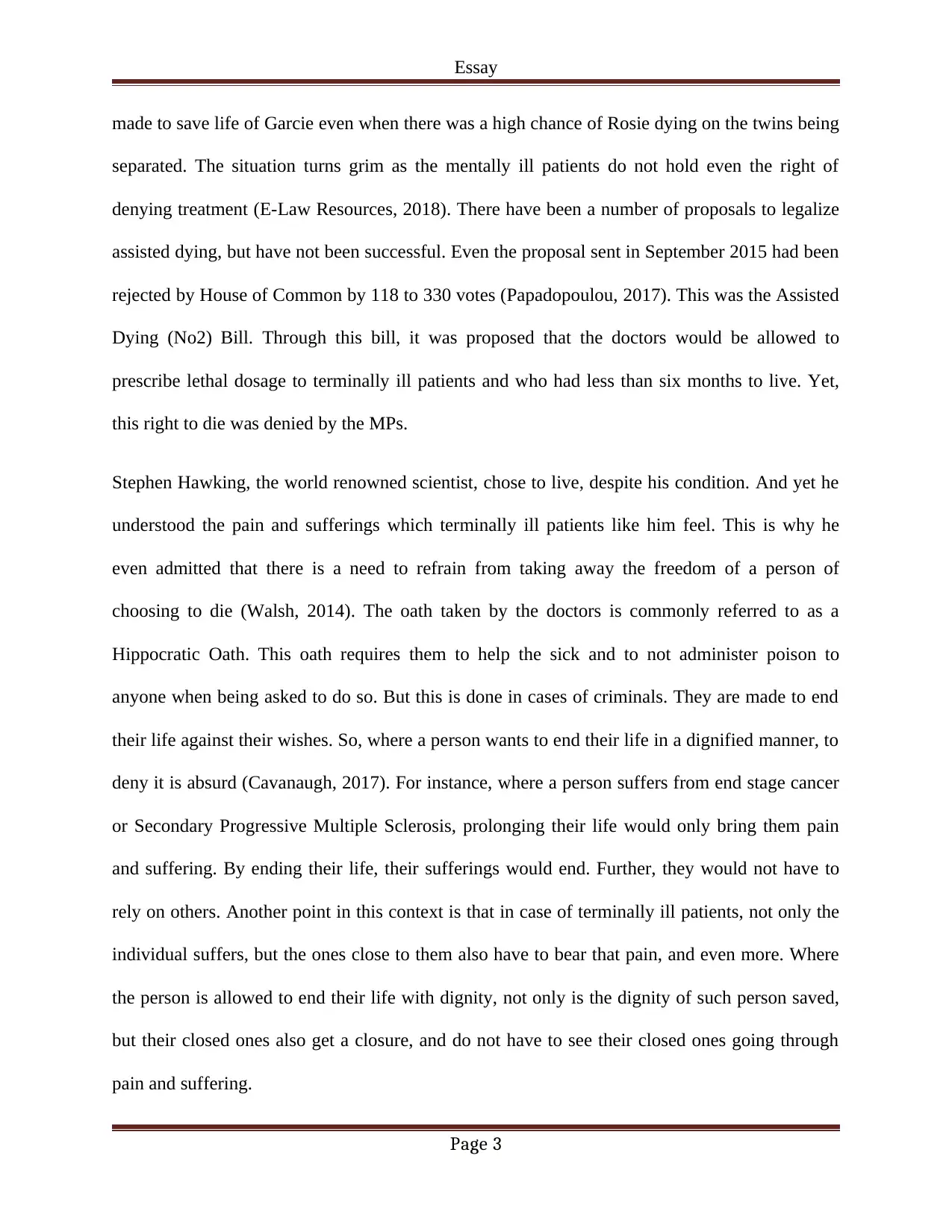
Essay
made to save life of Garcie even when there was a high chance of Rosie dying on the twins being
separated. The situation turns grim as the mentally ill patients do not hold even the right of
denying treatment (E-Law Resources, 2018). There have been a number of proposals to legalize
assisted dying, but have not been successful. Even the proposal sent in September 2015 had been
rejected by House of Common by 118 to 330 votes (Papadopoulou, 2017). This was the Assisted
Dying (No2) Bill. Through this bill, it was proposed that the doctors would be allowed to
prescribe lethal dosage to terminally ill patients and who had less than six months to live. Yet,
this right to die was denied by the MPs.
Stephen Hawking, the world renowned scientist, chose to live, despite his condition. And yet he
understood the pain and sufferings which terminally ill patients like him feel. This is why he
even admitted that there is a need to refrain from taking away the freedom of a person of
choosing to die (Walsh, 2014). The oath taken by the doctors is commonly referred to as a
Hippocratic Oath. This oath requires them to help the sick and to not administer poison to
anyone when being asked to do so. But this is done in cases of criminals. They are made to end
their life against their wishes. So, where a person wants to end their life in a dignified manner, to
deny it is absurd (Cavanaugh, 2017). For instance, where a person suffers from end stage cancer
or Secondary Progressive Multiple Sclerosis, prolonging their life would only bring them pain
and suffering. By ending their life, their sufferings would end. Further, they would not have to
rely on others. Another point in this context is that in case of terminally ill patients, not only the
individual suffers, but the ones close to them also have to bear that pain, and even more. Where
the person is allowed to end their life with dignity, not only is the dignity of such person saved,
but their closed ones also get a closure, and do not have to see their closed ones going through
pain and suffering.
Page 3
made to save life of Garcie even when there was a high chance of Rosie dying on the twins being
separated. The situation turns grim as the mentally ill patients do not hold even the right of
denying treatment (E-Law Resources, 2018). There have been a number of proposals to legalize
assisted dying, but have not been successful. Even the proposal sent in September 2015 had been
rejected by House of Common by 118 to 330 votes (Papadopoulou, 2017). This was the Assisted
Dying (No2) Bill. Through this bill, it was proposed that the doctors would be allowed to
prescribe lethal dosage to terminally ill patients and who had less than six months to live. Yet,
this right to die was denied by the MPs.
Stephen Hawking, the world renowned scientist, chose to live, despite his condition. And yet he
understood the pain and sufferings which terminally ill patients like him feel. This is why he
even admitted that there is a need to refrain from taking away the freedom of a person of
choosing to die (Walsh, 2014). The oath taken by the doctors is commonly referred to as a
Hippocratic Oath. This oath requires them to help the sick and to not administer poison to
anyone when being asked to do so. But this is done in cases of criminals. They are made to end
their life against their wishes. So, where a person wants to end their life in a dignified manner, to
deny it is absurd (Cavanaugh, 2017). For instance, where a person suffers from end stage cancer
or Secondary Progressive Multiple Sclerosis, prolonging their life would only bring them pain
and suffering. By ending their life, their sufferings would end. Further, they would not have to
rely on others. Another point in this context is that in case of terminally ill patients, not only the
individual suffers, but the ones close to them also have to bear that pain, and even more. Where
the person is allowed to end their life with dignity, not only is the dignity of such person saved,
but their closed ones also get a closure, and do not have to see their closed ones going through
pain and suffering.
Page 3
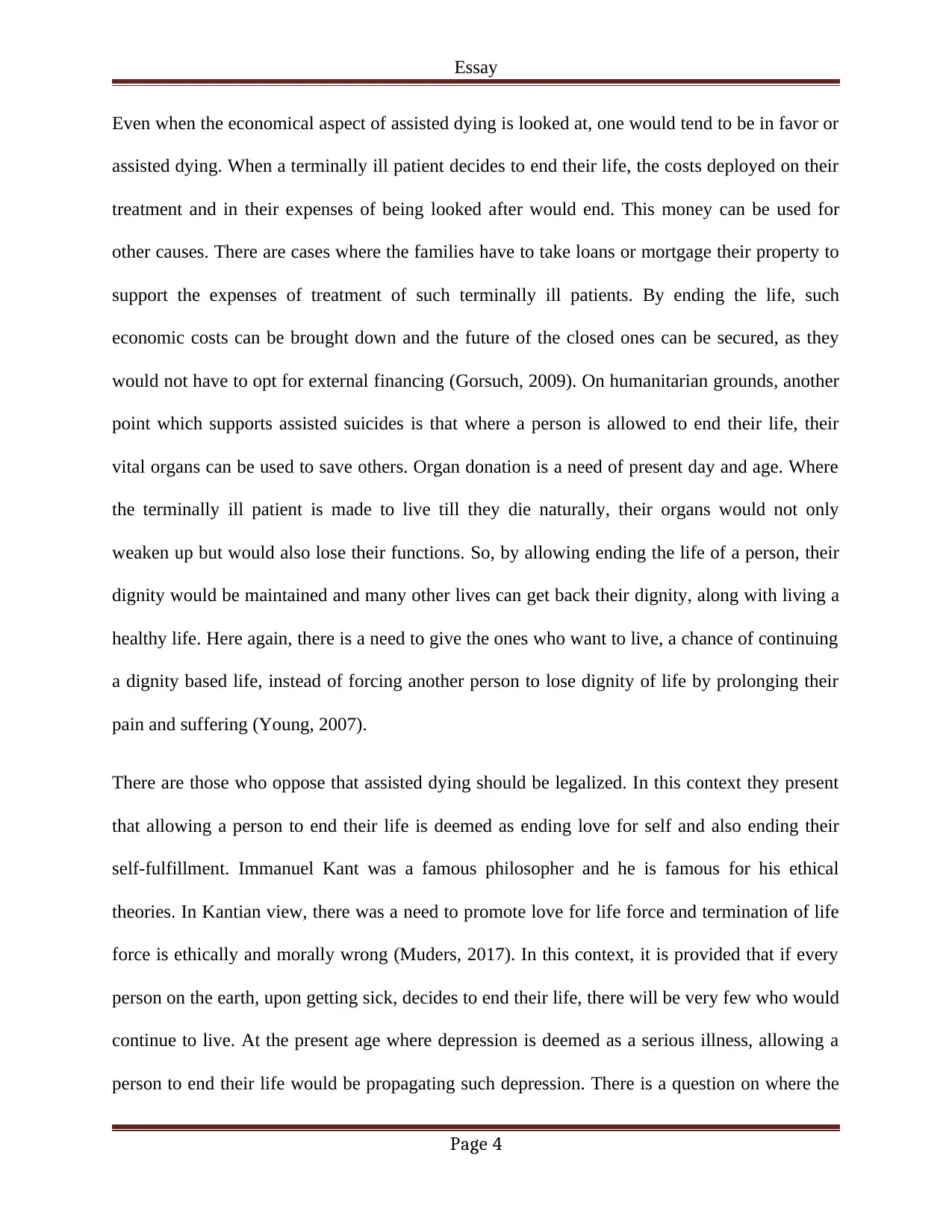
Essay
Even when the economical aspect of assisted dying is looked at, one would tend to be in favor or
assisted dying. When a terminally ill patient decides to end their life, the costs deployed on their
treatment and in their expenses of being looked after would end. This money can be used for
other causes. There are cases where the families have to take loans or mortgage their property to
support the expenses of treatment of such terminally ill patients. By ending the life, such
economic costs can be brought down and the future of the closed ones can be secured, as they
would not have to opt for external financing (Gorsuch, 2009). On humanitarian grounds, another
point which supports assisted suicides is that where a person is allowed to end their life, their
vital organs can be used to save others. Organ donation is a need of present day and age. Where
the terminally ill patient is made to live till they die naturally, their organs would not only
weaken up but would also lose their functions. So, by allowing ending the life of a person, their
dignity would be maintained and many other lives can get back their dignity, along with living a
healthy life. Here again, there is a need to give the ones who want to live, a chance of continuing
a dignity based life, instead of forcing another person to lose dignity of life by prolonging their
pain and suffering (Young, 2007).
There are those who oppose that assisted dying should be legalized. In this context they present
that allowing a person to end their life is deemed as ending love for self and also ending their
self-fulfillment. Immanuel Kant was a famous philosopher and he is famous for his ethical
theories. In Kantian view, there was a need to promote love for life force and termination of life
force is ethically and morally wrong (Muders, 2017). In this context, it is provided that if every
person on the earth, upon getting sick, decides to end their life, there will be very few who would
continue to live. At the present age where depression is deemed as a serious illness, allowing a
person to end their life would be propagating such depression. There is a question on where the
Page 4
Even when the economical aspect of assisted dying is looked at, one would tend to be in favor or
assisted dying. When a terminally ill patient decides to end their life, the costs deployed on their
treatment and in their expenses of being looked after would end. This money can be used for
other causes. There are cases where the families have to take loans or mortgage their property to
support the expenses of treatment of such terminally ill patients. By ending the life, such
economic costs can be brought down and the future of the closed ones can be secured, as they
would not have to opt for external financing (Gorsuch, 2009). On humanitarian grounds, another
point which supports assisted suicides is that where a person is allowed to end their life, their
vital organs can be used to save others. Organ donation is a need of present day and age. Where
the terminally ill patient is made to live till they die naturally, their organs would not only
weaken up but would also lose their functions. So, by allowing ending the life of a person, their
dignity would be maintained and many other lives can get back their dignity, along with living a
healthy life. Here again, there is a need to give the ones who want to live, a chance of continuing
a dignity based life, instead of forcing another person to lose dignity of life by prolonging their
pain and suffering (Young, 2007).
There are those who oppose that assisted dying should be legalized. In this context they present
that allowing a person to end their life is deemed as ending love for self and also ending their
self-fulfillment. Immanuel Kant was a famous philosopher and he is famous for his ethical
theories. In Kantian view, there was a need to promote love for life force and termination of life
force is ethically and morally wrong (Muders, 2017). In this context, it is provided that if every
person on the earth, upon getting sick, decides to end their life, there will be very few who would
continue to live. At the present age where depression is deemed as a serious illness, allowing a
person to end their life would be propagating such depression. There is a question on where the
Page 4
Secure Best Marks with AI Grader
Need help grading? Try our AI Grader for instant feedback on your assignments.
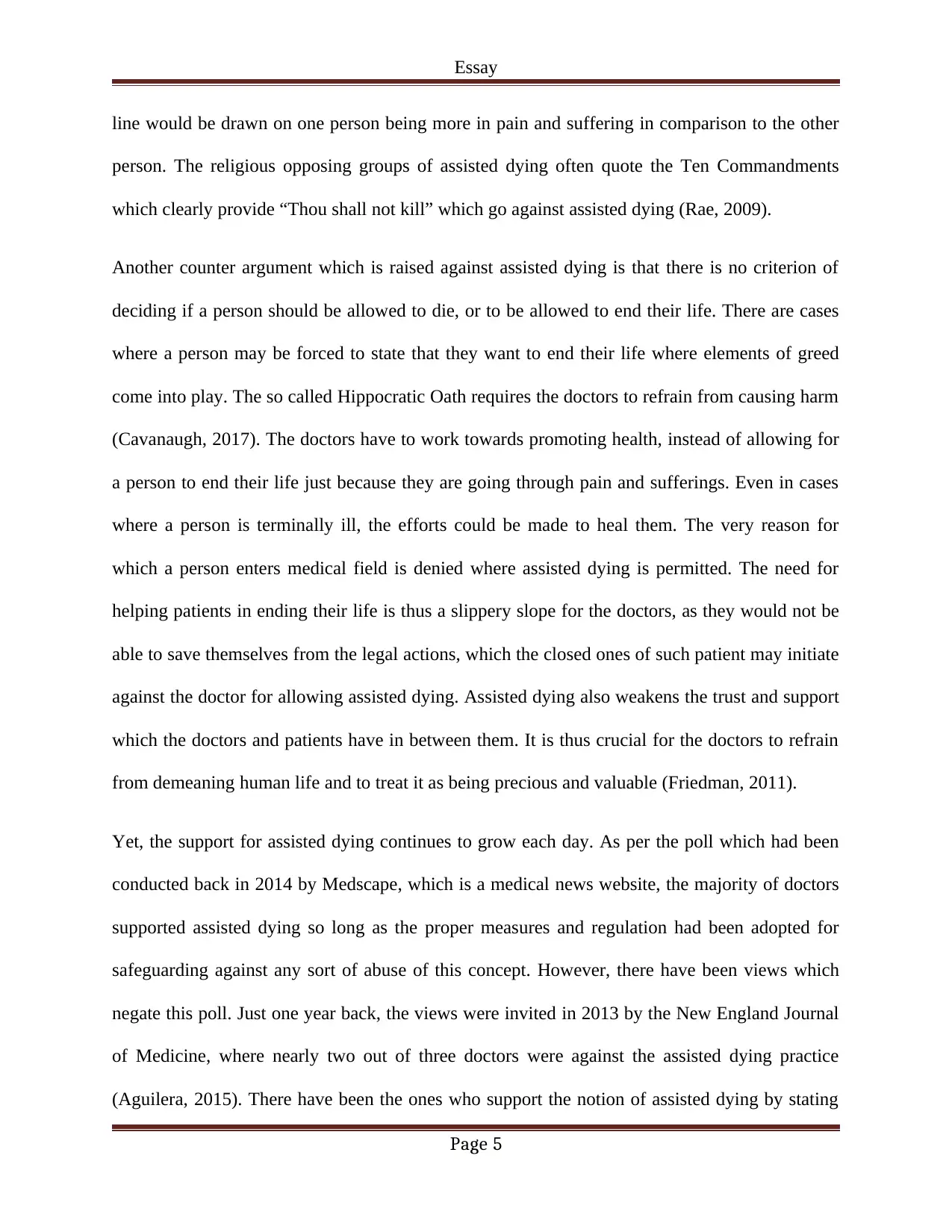
Essay
line would be drawn on one person being more in pain and suffering in comparison to the other
person. The religious opposing groups of assisted dying often quote the Ten Commandments
which clearly provide “Thou shall not kill” which go against assisted dying (Rae, 2009).
Another counter argument which is raised against assisted dying is that there is no criterion of
deciding if a person should be allowed to die, or to be allowed to end their life. There are cases
where a person may be forced to state that they want to end their life where elements of greed
come into play. The so called Hippocratic Oath requires the doctors to refrain from causing harm
(Cavanaugh, 2017). The doctors have to work towards promoting health, instead of allowing for
a person to end their life just because they are going through pain and sufferings. Even in cases
where a person is terminally ill, the efforts could be made to heal them. The very reason for
which a person enters medical field is denied where assisted dying is permitted. The need for
helping patients in ending their life is thus a slippery slope for the doctors, as they would not be
able to save themselves from the legal actions, which the closed ones of such patient may initiate
against the doctor for allowing assisted dying. Assisted dying also weakens the trust and support
which the doctors and patients have in between them. It is thus crucial for the doctors to refrain
from demeaning human life and to treat it as being precious and valuable (Friedman, 2011).
Yet, the support for assisted dying continues to grow each day. As per the poll which had been
conducted back in 2014 by Medscape, which is a medical news website, the majority of doctors
supported assisted dying so long as the proper measures and regulation had been adopted for
safeguarding against any sort of abuse of this concept. However, there have been views which
negate this poll. Just one year back, the views were invited in 2013 by the New England Journal
of Medicine, where nearly two out of three doctors were against the assisted dying practice
(Aguilera, 2015). There have been the ones who support the notion of assisted dying by stating
Page 5
line would be drawn on one person being more in pain and suffering in comparison to the other
person. The religious opposing groups of assisted dying often quote the Ten Commandments
which clearly provide “Thou shall not kill” which go against assisted dying (Rae, 2009).
Another counter argument which is raised against assisted dying is that there is no criterion of
deciding if a person should be allowed to die, or to be allowed to end their life. There are cases
where a person may be forced to state that they want to end their life where elements of greed
come into play. The so called Hippocratic Oath requires the doctors to refrain from causing harm
(Cavanaugh, 2017). The doctors have to work towards promoting health, instead of allowing for
a person to end their life just because they are going through pain and sufferings. Even in cases
where a person is terminally ill, the efforts could be made to heal them. The very reason for
which a person enters medical field is denied where assisted dying is permitted. The need for
helping patients in ending their life is thus a slippery slope for the doctors, as they would not be
able to save themselves from the legal actions, which the closed ones of such patient may initiate
against the doctor for allowing assisted dying. Assisted dying also weakens the trust and support
which the doctors and patients have in between them. It is thus crucial for the doctors to refrain
from demeaning human life and to treat it as being precious and valuable (Friedman, 2011).
Yet, the support for assisted dying continues to grow each day. As per the poll which had been
conducted back in 2014 by Medscape, which is a medical news website, the majority of doctors
supported assisted dying so long as the proper measures and regulation had been adopted for
safeguarding against any sort of abuse of this concept. However, there have been views which
negate this poll. Just one year back, the views were invited in 2013 by the New England Journal
of Medicine, where nearly two out of three doctors were against the assisted dying practice
(Aguilera, 2015). There have been the ones who support the notion of assisted dying by stating
Page 5
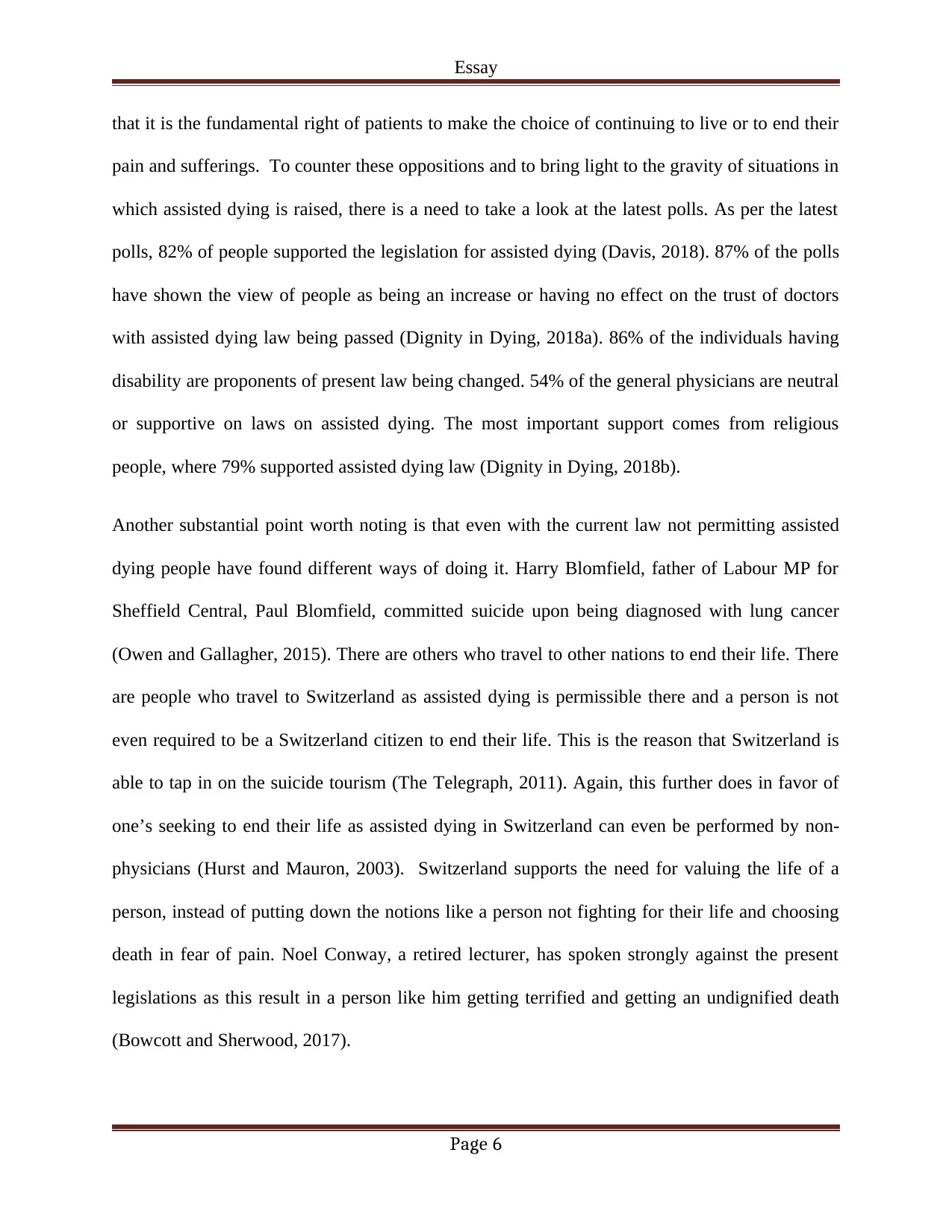
Essay
that it is the fundamental right of patients to make the choice of continuing to live or to end their
pain and sufferings. To counter these oppositions and to bring light to the gravity of situations in
which assisted dying is raised, there is a need to take a look at the latest polls. As per the latest
polls, 82% of people supported the legislation for assisted dying (Davis, 2018). 87% of the polls
have shown the view of people as being an increase or having no effect on the trust of doctors
with assisted dying law being passed (Dignity in Dying, 2018a). 86% of the individuals having
disability are proponents of present law being changed. 54% of the general physicians are neutral
or supportive on laws on assisted dying. The most important support comes from religious
people, where 79% supported assisted dying law (Dignity in Dying, 2018b).
Another substantial point worth noting is that even with the current law not permitting assisted
dying people have found different ways of doing it. Harry Blomfield, father of Labour MP for
Sheffield Central, Paul Blomfield, committed suicide upon being diagnosed with lung cancer
(Owen and Gallagher, 2015). There are others who travel to other nations to end their life. There
are people who travel to Switzerland as assisted dying is permissible there and a person is not
even required to be a Switzerland citizen to end their life. This is the reason that Switzerland is
able to tap in on the suicide tourism (The Telegraph, 2011). Again, this further does in favor of
one’s seeking to end their life as assisted dying in Switzerland can even be performed by non-
physicians (Hurst and Mauron, 2003). Switzerland supports the need for valuing the life of a
person, instead of putting down the notions like a person not fighting for their life and choosing
death in fear of pain. Noel Conway, a retired lecturer, has spoken strongly against the present
legislations as this result in a person like him getting terrified and getting an undignified death
(Bowcott and Sherwood, 2017).
Page 6
that it is the fundamental right of patients to make the choice of continuing to live or to end their
pain and sufferings. To counter these oppositions and to bring light to the gravity of situations in
which assisted dying is raised, there is a need to take a look at the latest polls. As per the latest
polls, 82% of people supported the legislation for assisted dying (Davis, 2018). 87% of the polls
have shown the view of people as being an increase or having no effect on the trust of doctors
with assisted dying law being passed (Dignity in Dying, 2018a). 86% of the individuals having
disability are proponents of present law being changed. 54% of the general physicians are neutral
or supportive on laws on assisted dying. The most important support comes from religious
people, where 79% supported assisted dying law (Dignity in Dying, 2018b).
Another substantial point worth noting is that even with the current law not permitting assisted
dying people have found different ways of doing it. Harry Blomfield, father of Labour MP for
Sheffield Central, Paul Blomfield, committed suicide upon being diagnosed with lung cancer
(Owen and Gallagher, 2015). There are others who travel to other nations to end their life. There
are people who travel to Switzerland as assisted dying is permissible there and a person is not
even required to be a Switzerland citizen to end their life. This is the reason that Switzerland is
able to tap in on the suicide tourism (The Telegraph, 2011). Again, this further does in favor of
one’s seeking to end their life as assisted dying in Switzerland can even be performed by non-
physicians (Hurst and Mauron, 2003). Switzerland supports the need for valuing the life of a
person, instead of putting down the notions like a person not fighting for their life and choosing
death in fear of pain. Noel Conway, a retired lecturer, has spoken strongly against the present
legislations as this result in a person like him getting terrified and getting an undignified death
(Bowcott and Sherwood, 2017).
Page 6
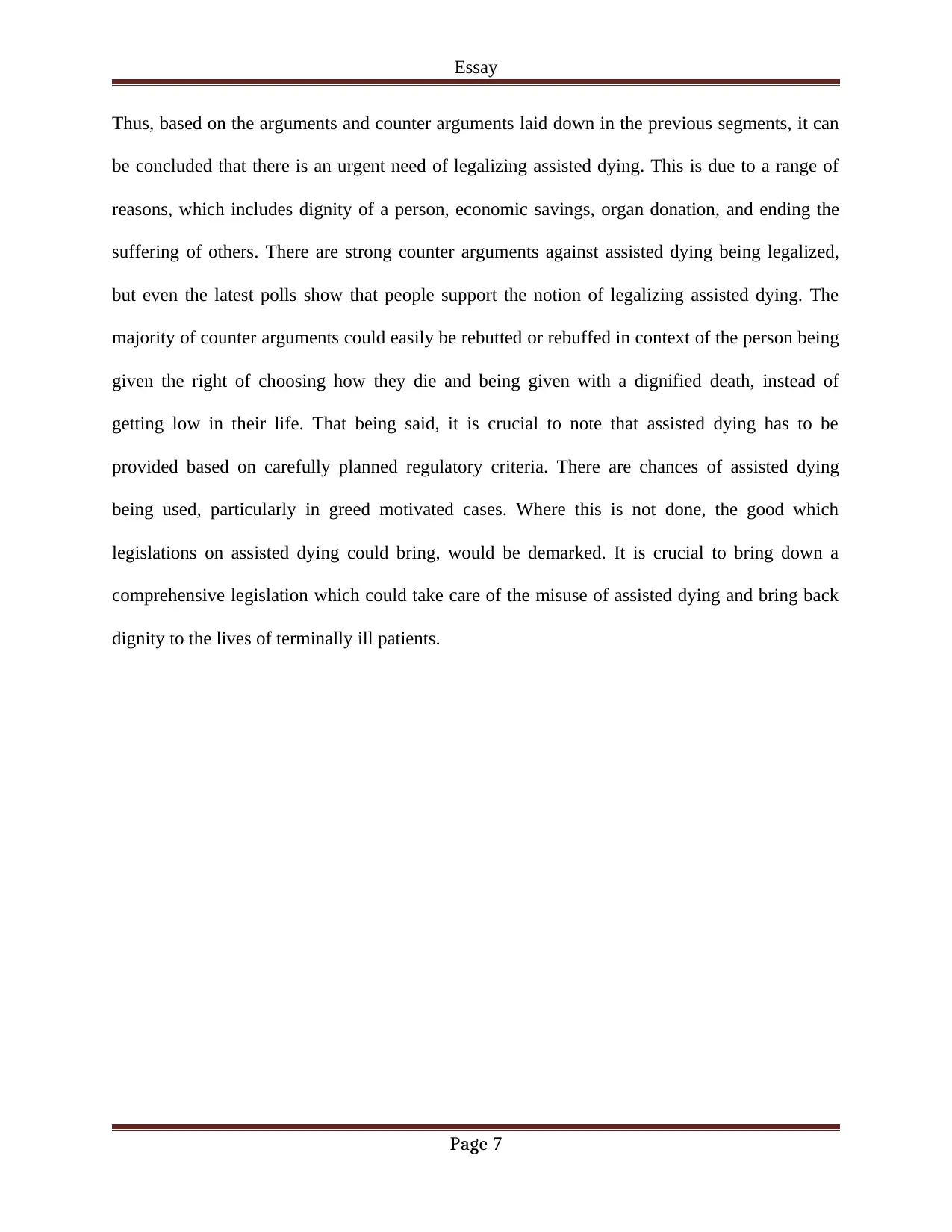
Essay
Thus, based on the arguments and counter arguments laid down in the previous segments, it can
be concluded that there is an urgent need of legalizing assisted dying. This is due to a range of
reasons, which includes dignity of a person, economic savings, organ donation, and ending the
suffering of others. There are strong counter arguments against assisted dying being legalized,
but even the latest polls show that people support the notion of legalizing assisted dying. The
majority of counter arguments could easily be rebutted or rebuffed in context of the person being
given the right of choosing how they die and being given with a dignified death, instead of
getting low in their life. That being said, it is crucial to note that assisted dying has to be
provided based on carefully planned regulatory criteria. There are chances of assisted dying
being used, particularly in greed motivated cases. Where this is not done, the good which
legislations on assisted dying could bring, would be demarked. It is crucial to bring down a
comprehensive legislation which could take care of the misuse of assisted dying and bring back
dignity to the lives of terminally ill patients.
Page 7
Thus, based on the arguments and counter arguments laid down in the previous segments, it can
be concluded that there is an urgent need of legalizing assisted dying. This is due to a range of
reasons, which includes dignity of a person, economic savings, organ donation, and ending the
suffering of others. There are strong counter arguments against assisted dying being legalized,
but even the latest polls show that people support the notion of legalizing assisted dying. The
majority of counter arguments could easily be rebutted or rebuffed in context of the person being
given the right of choosing how they die and being given with a dignified death, instead of
getting low in their life. That being said, it is crucial to note that assisted dying has to be
provided based on carefully planned regulatory criteria. There are chances of assisted dying
being used, particularly in greed motivated cases. Where this is not done, the good which
legislations on assisted dying could bring, would be demarked. It is crucial to bring down a
comprehensive legislation which could take care of the misuse of assisted dying and bring back
dignity to the lives of terminally ill patients.
Page 7
Paraphrase This Document
Need a fresh take? Get an instant paraphrase of this document with our AI Paraphraser
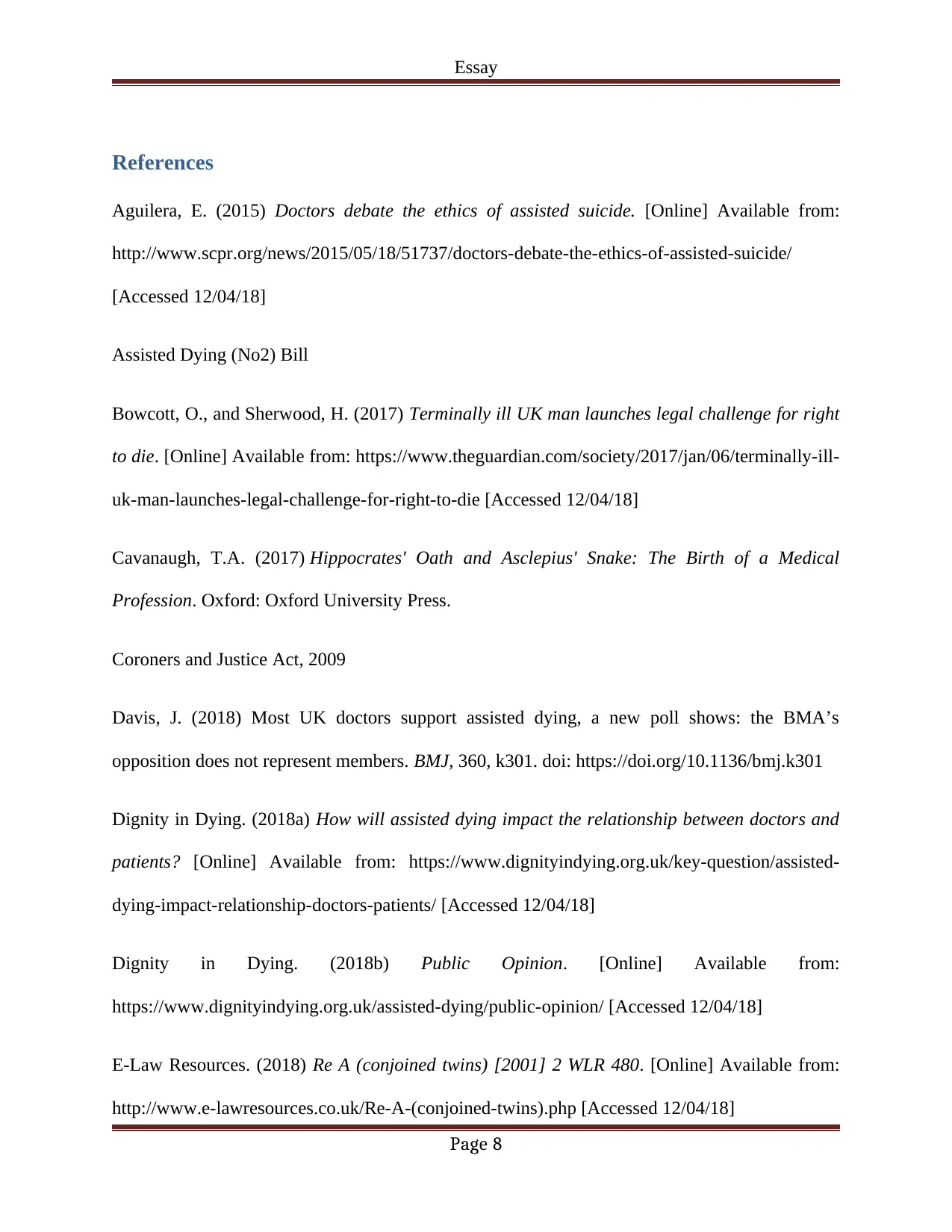
Essay
References
Aguilera, E. (2015) Doctors debate the ethics of assisted suicide. [Online] Available from:
http://www.scpr.org/news/2015/05/18/51737/doctors-debate-the-ethics-of-assisted-suicide/
[Accessed 12/04/18]
Assisted Dying (No2) Bill
Bowcott, O., and Sherwood, H. (2017) Terminally ill UK man launches legal challenge for right
to die. [Online] Available from: https://www.theguardian.com/society/2017/jan/06/terminally-ill-
uk-man-launches-legal-challenge-for-right-to-die [Accessed 12/04/18]
Cavanaugh, T.A. (2017) Hippocrates' Oath and Asclepius' Snake: The Birth of a Medical
Profession. Oxford: Oxford University Press.
Coroners and Justice Act, 2009
Davis, J. (2018) Most UK doctors support assisted dying, a new poll shows: the BMA’s
opposition does not represent members. BMJ, 360, k301. doi: https://doi.org/10.1136/bmj.k301
Dignity in Dying. (2018a) How will assisted dying impact the relationship between doctors and
patients? [Online] Available from: https://www.dignityindying.org.uk/key-question/assisted-
dying-impact-relationship-doctors-patients/ [Accessed 12/04/18]
Dignity in Dying. (2018b) Public Opinion. [Online] Available from:
https://www.dignityindying.org.uk/assisted-dying/public-opinion/ [Accessed 12/04/18]
E-Law Resources. (2018) Re A (conjoined twins) [2001] 2 WLR 480. [Online] Available from:
http://www.e-lawresources.co.uk/Re-A-(conjoined-twins).php [Accessed 12/04/18]
Page 8
References
Aguilera, E. (2015) Doctors debate the ethics of assisted suicide. [Online] Available from:
http://www.scpr.org/news/2015/05/18/51737/doctors-debate-the-ethics-of-assisted-suicide/
[Accessed 12/04/18]
Assisted Dying (No2) Bill
Bowcott, O., and Sherwood, H. (2017) Terminally ill UK man launches legal challenge for right
to die. [Online] Available from: https://www.theguardian.com/society/2017/jan/06/terminally-ill-
uk-man-launches-legal-challenge-for-right-to-die [Accessed 12/04/18]
Cavanaugh, T.A. (2017) Hippocrates' Oath and Asclepius' Snake: The Birth of a Medical
Profession. Oxford: Oxford University Press.
Coroners and Justice Act, 2009
Davis, J. (2018) Most UK doctors support assisted dying, a new poll shows: the BMA’s
opposition does not represent members. BMJ, 360, k301. doi: https://doi.org/10.1136/bmj.k301
Dignity in Dying. (2018a) How will assisted dying impact the relationship between doctors and
patients? [Online] Available from: https://www.dignityindying.org.uk/key-question/assisted-
dying-impact-relationship-doctors-patients/ [Accessed 12/04/18]
Dignity in Dying. (2018b) Public Opinion. [Online] Available from:
https://www.dignityindying.org.uk/assisted-dying/public-opinion/ [Accessed 12/04/18]
E-Law Resources. (2018) Re A (conjoined twins) [2001] 2 WLR 480. [Online] Available from:
http://www.e-lawresources.co.uk/Re-A-(conjoined-twins).php [Accessed 12/04/18]
Page 8
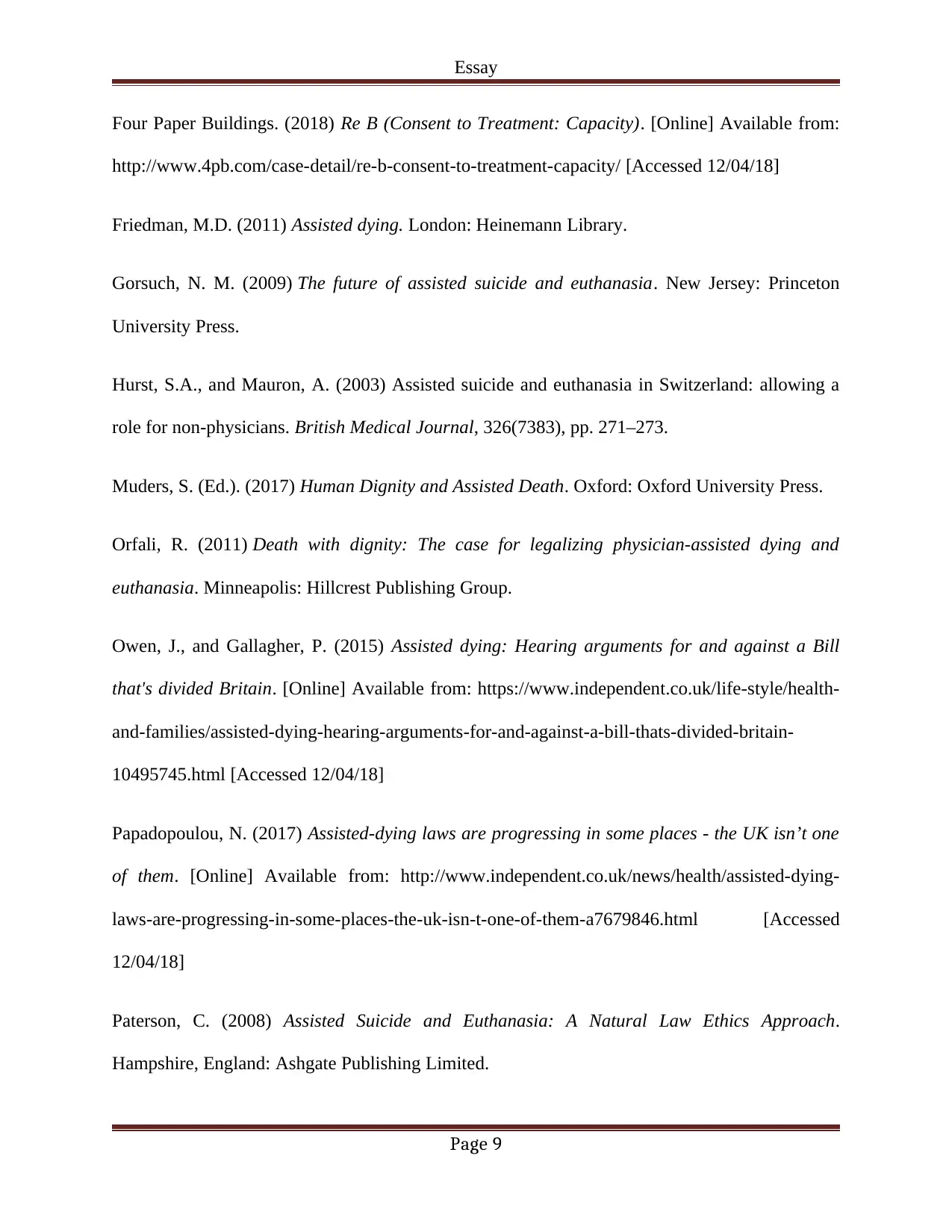
Essay
Four Paper Buildings. (2018) Re B (Consent to Treatment: Capacity). [Online] Available from:
http://www.4pb.com/case-detail/re-b-consent-to-treatment-capacity/ [Accessed 12/04/18]
Friedman, M.D. (2011) Assisted dying. London: Heinemann Library.
Gorsuch, N. M. (2009) The future of assisted suicide and euthanasia. New Jersey: Princeton
University Press.
Hurst, S.A., and Mauron, A. (2003) Assisted suicide and euthanasia in Switzerland: allowing a
role for non-physicians. British Medical Journal, 326(7383), pp. 271–273.
Muders, S. (Ed.). (2017) Human Dignity and Assisted Death. Oxford: Oxford University Press.
Orfali, R. (2011) Death with dignity: The case for legalizing physician-assisted dying and
euthanasia. Minneapolis: Hillcrest Publishing Group.
Owen, J., and Gallagher, P. (2015) Assisted dying: Hearing arguments for and against a Bill
that's divided Britain. [Online] Available from: https://www.independent.co.uk/life-style/health-
and-families/assisted-dying-hearing-arguments-for-and-against-a-bill-thats-divided-britain-
10495745.html [Accessed 12/04/18]
Papadopoulou, N. (2017) Assisted-dying laws are progressing in some places - the UK isn’t one
of them. [Online] Available from: http://www.independent.co.uk/news/health/assisted-dying-
laws-are-progressing-in-some-places-the-uk-isn-t-one-of-them-a7679846.html [Accessed
12/04/18]
Paterson, C. (2008) Assisted Suicide and Euthanasia: A Natural Law Ethics Approach.
Hampshire, England: Ashgate Publishing Limited.
Page 9
Four Paper Buildings. (2018) Re B (Consent to Treatment: Capacity). [Online] Available from:
http://www.4pb.com/case-detail/re-b-consent-to-treatment-capacity/ [Accessed 12/04/18]
Friedman, M.D. (2011) Assisted dying. London: Heinemann Library.
Gorsuch, N. M. (2009) The future of assisted suicide and euthanasia. New Jersey: Princeton
University Press.
Hurst, S.A., and Mauron, A. (2003) Assisted suicide and euthanasia in Switzerland: allowing a
role for non-physicians. British Medical Journal, 326(7383), pp. 271–273.
Muders, S. (Ed.). (2017) Human Dignity and Assisted Death. Oxford: Oxford University Press.
Orfali, R. (2011) Death with dignity: The case for legalizing physician-assisted dying and
euthanasia. Minneapolis: Hillcrest Publishing Group.
Owen, J., and Gallagher, P. (2015) Assisted dying: Hearing arguments for and against a Bill
that's divided Britain. [Online] Available from: https://www.independent.co.uk/life-style/health-
and-families/assisted-dying-hearing-arguments-for-and-against-a-bill-thats-divided-britain-
10495745.html [Accessed 12/04/18]
Papadopoulou, N. (2017) Assisted-dying laws are progressing in some places - the UK isn’t one
of them. [Online] Available from: http://www.independent.co.uk/news/health/assisted-dying-
laws-are-progressing-in-some-places-the-uk-isn-t-one-of-them-a7679846.html [Accessed
12/04/18]
Paterson, C. (2008) Assisted Suicide and Euthanasia: A Natural Law Ethics Approach.
Hampshire, England: Ashgate Publishing Limited.
Page 9
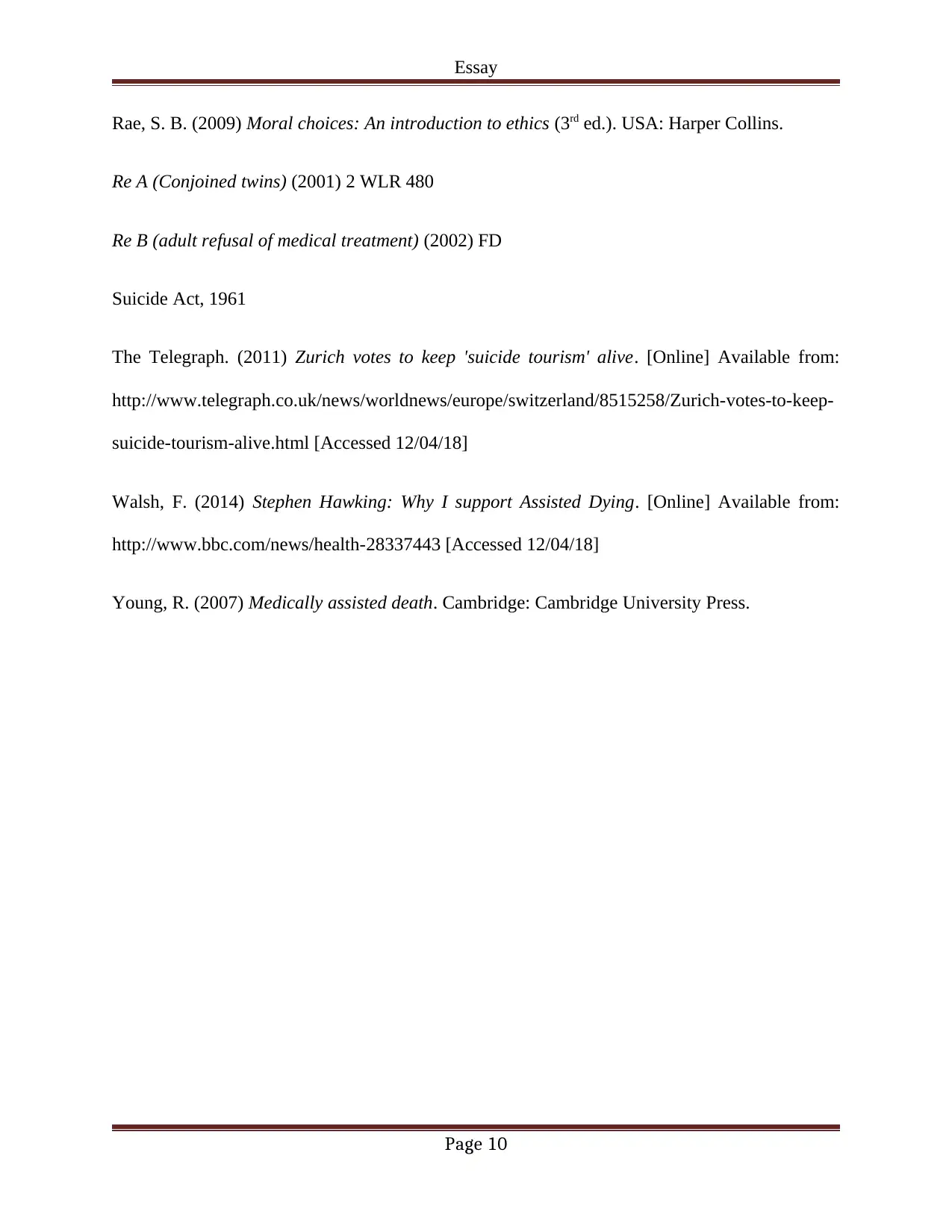
Essay
Rae, S. B. (2009) Moral choices: An introduction to ethics (3rd ed.). USA: Harper Collins.
Re A (Conjoined twins) (2001) 2 WLR 480
Re B (adult refusal of medical treatment) (2002) FD
Suicide Act, 1961
The Telegraph. (2011) Zurich votes to keep 'suicide tourism' alive. [Online] Available from:
http://www.telegraph.co.uk/news/worldnews/europe/switzerland/8515258/Zurich-votes-to-keep-
suicide-tourism-alive.html [Accessed 12/04/18]
Walsh, F. (2014) Stephen Hawking: Why I support Assisted Dying. [Online] Available from:
http://www.bbc.com/news/health-28337443 [Accessed 12/04/18]
Young, R. (2007) Medically assisted death. Cambridge: Cambridge University Press.
Page 10
Rae, S. B. (2009) Moral choices: An introduction to ethics (3rd ed.). USA: Harper Collins.
Re A (Conjoined twins) (2001) 2 WLR 480
Re B (adult refusal of medical treatment) (2002) FD
Suicide Act, 1961
The Telegraph. (2011) Zurich votes to keep 'suicide tourism' alive. [Online] Available from:
http://www.telegraph.co.uk/news/worldnews/europe/switzerland/8515258/Zurich-votes-to-keep-
suicide-tourism-alive.html [Accessed 12/04/18]
Walsh, F. (2014) Stephen Hawking: Why I support Assisted Dying. [Online] Available from:
http://www.bbc.com/news/health-28337443 [Accessed 12/04/18]
Young, R. (2007) Medically assisted death. Cambridge: Cambridge University Press.
Page 10
1 out of 10
Related Documents
Your All-in-One AI-Powered Toolkit for Academic Success.
+13062052269
info@desklib.com
Available 24*7 on WhatsApp / Email
![[object Object]](/_next/static/media/star-bottom.7253800d.svg)
Unlock your academic potential
© 2024 | Zucol Services PVT LTD | All rights reserved.





